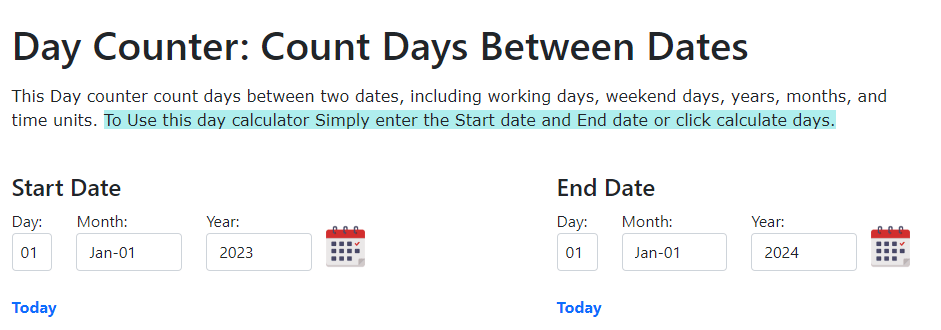In our fast-paced, interconnected world, staying on top of important events and special occasions has never been more critical. Whether you’re managing personal milestones, business deadlines, or global celebrations, the digital landscape offers a plethora of tools to help you track event days online. In this comprehensive guide, we’ll explore various methods, platforms, and strategies to ensure you never miss a significant date again.
I. Utilizing Calendar Apps for Seamless Event Tracking
One of the most efficient ways to track days online is through calendar apps. These digital tools not only help you organize your schedule but also offer features that make event management a breeze.
A. Google Calendar: The Powerhouse of Event Tracking
Google Calendar stands out as a versatile and user-friendly option. With its seamless integration with other Google services, it allows users to create events, set reminders, and share calendars effortlessly. The platform also offers color-coded categorization, making it easy to distinguish between personal, work, and shared events.
B. Microsoft Outlook: Streamlining Personal and Professional Events
Outlook is a robust choice for individuals seeking a unified platform for personal and professional event tracking. Its integration with email services, task management, and collaborative features makes it an ideal choice for those juggling various responsibilities.
C. Apple Calendar: Syncing Across Apple Ecosystem
For users immersed in the Apple ecosystem, the Apple Calendar provides a seamless experience. With synchronization across devices, including iPhones, iPads, and Macs, tracking events becomes a cohesive and integrated process.
II. Event Tracking through Specialized Platforms
Beyond general-purpose calendar apps, several specialized platforms cater specifically to event tracking, offering unique features tailored to various needs.
A. Eventbrite: Unleashing the Power of Online Event Management
Eventbrite is a go-to platform for tracking and managing events, particularly for those involved in event planning or hosting. From creating invitations to selling tickets and tracking attendance, Eventbrite provides a comprehensive solution for both virtual and physical gatherings.
B. Meetup: Connecting with Like-minded Individuals
Meetup is an excellent platform for tracking events related to specific interests or communities. Users can discover and join local or virtual meetups, fostering connections with like-minded individuals and ensuring that they never miss out on events aligned with their passions.
C. Facebook Events: Socializing and Event Tracking Combined
With billions of users worldwide, Facebook Events is a powerful tool for tracking social gatherings, both virtual and in-person. The platform allows users to create, discover, and RSVP to events, ensuring that they stay connected with friends, family, and community happenings.
III. Integrating Social Media for Event Notifications
Social media platforms are not just for staying in touch with friends and family; they can also serve as effective tools for tracking events.
A. Twitter: Real-time Event Updates
Twitter’s real-time nature makes it a valuable resource for tracking live events, breaking news, and updates. By following relevant hashtags and accounts, users can stay informed about the latest happenings in their areas of interest.
B. Facebook and Instagram: Event Updates in Your Social Feed
Both Facebook and Instagram provide event features that allow users to create, share, and discover events within their social circles. Leveraging these platforms ensures that users receive event updates directly in their social feeds, making event tracking a seamless part of their online experience.
IV. Maximizing Mobile Apps for On-the-Go Event Tracking
In an era where mobility is key, mobile apps play a crucial role in ensuring that users can track events anytime, anywhere.
A. Todoist: Task Management and Event Tracking in One
Todoist is a popular task management app that goes beyond simple to-do lists. Users can schedule tasks as events, set deadlines, and receive reminders, making it a comprehensive tool for managing both daily activities and special occasions.
B. Any.do: Intuitive Event Tracking with a Modern Interface
Any.do is known for its sleek design and intuitive user interface. The app seamlessly integrates event tracking with task management, providing users with a visually appealing and efficient tool for staying organized.
V. Exploring Advanced Event Tracking Strategies
For those seeking more advanced event tracking capabilities, there are strategies and tools that go beyond the basics.
A. IFTTT (If This Then That): Automating Event Notifications
IFTTT is a powerful automation tool that connects various apps and devices to trigger actions based on predefined conditions. Users can create custom “applets” to receive event notifications through multiple channels, ensuring they never miss an important date.
B. Customizable Widgets: Bringing Event Information to Your Home Screen
Many smartphones allow users to add customizable widgets to their home screens. By selecting a calendar widget, users can have a visual overview of upcoming events without having to open a dedicated app, streamlining the event tracking process.
VI. Ensuring Data Security and Privacy
As we immerse ourselves in the digital realm, it’s crucial to address concerns related to data security and privacy when tracking event days online.
A. Privacy Settings: Managing Access to Event Information
Most online platforms provide privacy settings that allow users to control who can view their events. Understanding and customizing these settings ensures that users can track events securely, sharing information only with those they choose.
B. Two-Factor Authentication: Enhancing Account Security
Implementing two-factor authentication adds an extra layer of security to online accounts. This step is particularly important when using platforms that store personal event information to prevent unauthorized access.
Conclusion
In the era of digital connectivity, tracking event days online has become an integral part of our daily lives. Whether using calendar apps, specialized platforms, social media, or mobile apps, the key is to find a method that suits your preferences and lifestyle. By exploring various tools and strategies, you can streamline event tracking, ensuring that you stay organized and never miss a momentous occasion again. Embrace the power of digital tools, customize your approach, and let technology work for you as you navigate the ever-expanding landscape of online event tracking.



